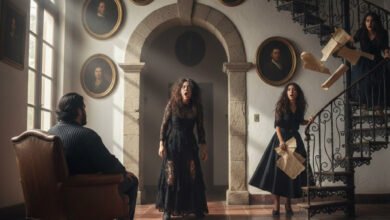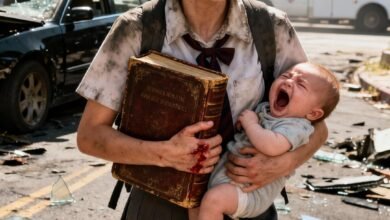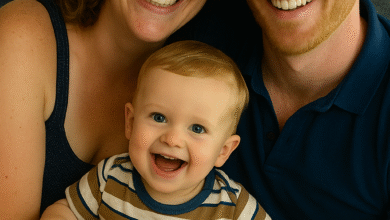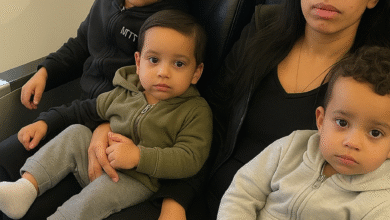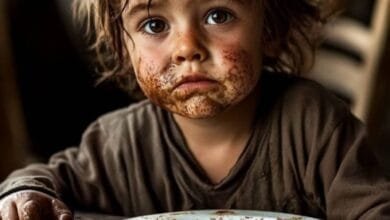I MOVED MY GRADUATION TO OUR DRIVEWAY SO MY DAD COULD SEE IT.
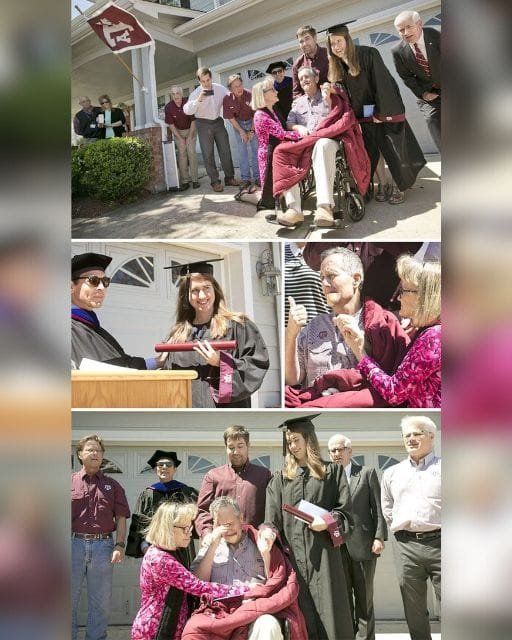
We knew he wouldn’t make it to campus.
The short walk from the parking lot to the stadium would’ve been too much. The doctors were clear—he had weeks, maybe days. But Dad was stubborn. And proud. He always said he wanted to see me walk across that stage, diploma in hand.
So, I brought the stage to him.
I emailed my dean, knowing it was a long shot. “Is there any chance,” I asked, “you could bring the ceremony to us?” Two hours later, he replied: “We’re on it.”

And that morning, on what should’ve been my graduation day, a small army in maroon showed up on our front lawn. Professors, admin staff, even a few guys from Dad’s old Aggie class. They set up a podium next to the garage. My gown was wrinkled. My tassel was backwards.
None of it mattered.
When I turned the corner and saw my dad—wrapped in that worn university blanket, oxygen tank by his side, eyes already brimming with tears—I nearly fell apart.
He held my hand the whole time I stood there. And when they handed me the diploma and said my name, he gave me the slowest, shakiest thumbs-up. The kind you give when you don’t have words anymore.
Then, as everyone clapped, he leaned in and whispered something only I could hear.
He said,
“Now open the back pocket.”
At first, I frowned in confusion. What back pocket? Then I realized he meant my gown. I reached around awkwardly while standing still, expecting to find lint or nothing at all. Instead, my fingers touched paper. I pulled it out carefully—a folded letter, yellowed and creased, like it had been opened and read many times.
“What’s this?” I asked, my voice trembling.
“You’ll read it later,” he whispered, breath shallow. “When you’re ready.”
After the ceremony, we had cake and lemonade under the big oak tree. My mom bustled around, making sure everyone had seconds, even though her hands trembled as she poured drinks. She kept glancing at Dad, propped up in his wheelchair, offering tired smiles.
I tucked the letter into my jeans pocket. It was too much to process. I wandered through the crowd, getting hugs and congratulations, feeling both grateful and heavy. People told me it was the most meaningful graduation they’d ever witnessed—that they could feel the love in the air. It was beautiful, but also bittersweet. We all knew this might be one of our last family moments like that.
As the sun dipped low and stretched shadows across the driveway, Dad waved me over. He looked smaller than ever—fragile—but his eyes still carried that fire I’d always admired.
“You did good today,” he said gently. “Made your old man proud.”
“I wouldn’t be here without you,” I told him, choking up. “You’ve always been my greatest teacher.”
His lips curled into a faint smile.
“Not everything,” he said. “That letter… it’s what I never managed to say out loud.”
Before I could ask anything more, he closed his eyes and leaned back. I thought he’d drifted off, so I let him rest.
Later that night, after the chairs were stacked and the leftovers stored, I sat alone in my room, staring at the envelope. The house was quiet except for the low hum of the fridge downstairs. My hands shook as I opened the letter and smoothed it out on the desk.
The handwriting was clearly Dad’s—messy but purposeful, slanting upward like he’d written quickly but tried to stay neat.
Dear Riley,
If you’re reading this, I may no longer be here. Or maybe I am, but saying these things in person has always been hard. I want to tell you something important.
First, I’m sorry. I’m sorry for the times I wasn’t patient, for the silly arguments, for not being the perfect father I wanted to be. Life gets messy, and I’ve made my share of mistakes. But I tried my best—every single day.
I owe you a bigger apology, too. There’s a truth I’ve hidden for a long time. From the moment you were born, I promised I’d be better—for you and for your mom. But I failed. Not just once, but in ways that shaped our lives more than I ever wanted.
Before you were born, I made a bad mistake. I took out a loan I couldn’t pay back, thinking I’d fix it quickly. But it spiraled. We lost almost everything. That’s why we moved to the little house on the edge of town, why your mom picked up extra shifts at the diner, why Christmases were smaller than they should’ve been.
I told myself I’d find a way to make it right. But I couldn’t. And when you were old enough to understand, I convinced myself it was better if you didn’t know. Better if you thought we were just a normal family trying to get by.
Watching you graduate, I realize now—I was wrong. You deserve the truth, no matter when it comes.
Now for the other part. Years ago, I started saving. Not much, just little bits when I could. It’s not in the bank—it’s in the attic, behind the loose panel above the stairs. Use it however you need. Pay off debt, chase a dream, save it for a rainy day. Whatever helps you move forward.
I hope you understand why I kept this to myself. And I hope you remember what I tried to teach: work hard, take ownership, and fight for what matters.
With all my love,
Dad
I stared at the page, heart pounding. Shock. Anger. Grief. So many feelings twisted together. He had carried all that alone?
I crept up to the attic with a flashlight. Behind the panel, sure enough, was a metal box. Inside: stacks of bills, wrapped with rubber bands, and a notebook tracking every deposit. It was a lot. Enough to change everything.
For a moment, I wanted to scream. Cry. Throw the box. How could he keep this from me? How could he carry that burden all alone?
But then I thought of him that morning—eyes full of pride, hand squeezing mine. He hadn’t done this for himself. He’d done it for me.
The next morning, I sat beside him, holding his hand. His breathing was slow, shallow. But when he felt my touch, he opened his eyes.
“I read your letter,” I whispered.
He nodded slowly, waiting.
“I’m angry,” I told him. “But I’m proud of you too. You did what you thought was right. You protected us.”
A tear rolled down his cheek.
“It doesn’t make it okay,” he whispered.
“No,” I said. “But it helps me understand.”
We sat in silence, holding hands. And then I leaned closer and said,
“Thank you.”
He gave me the faintest smile, then closed his eyes again.
Dad passed peacefully two days later, surrounded by family. In the weeks that followed, I used that money to pay off my student loans—and I started a scholarship in his name, for students who needed a second chance. Just like he once did.
Forgiving him wasn’t easy. Some hurts run deep. But I learned something important: forgiveness isn’t forgetting. It’s letting go of what keeps you stuck.
Life gets messy. People make mistakes. But love—even flawed—can still guide us forward.
If this story touched your heart, please share it. Let’s spread grace, and remind each other: there’s beauty in imperfection. ❤️
